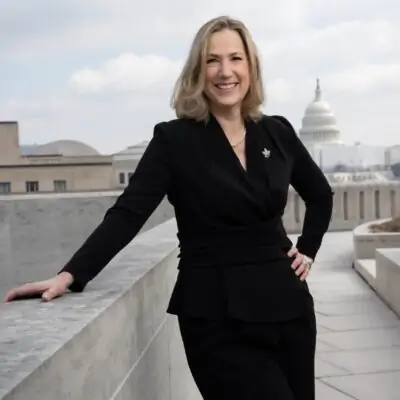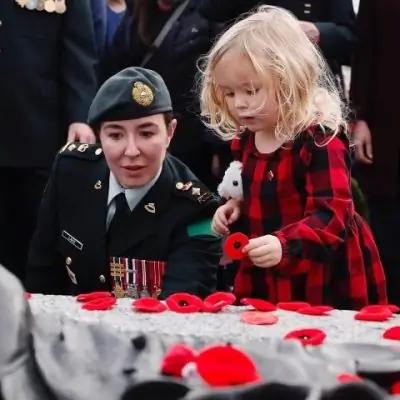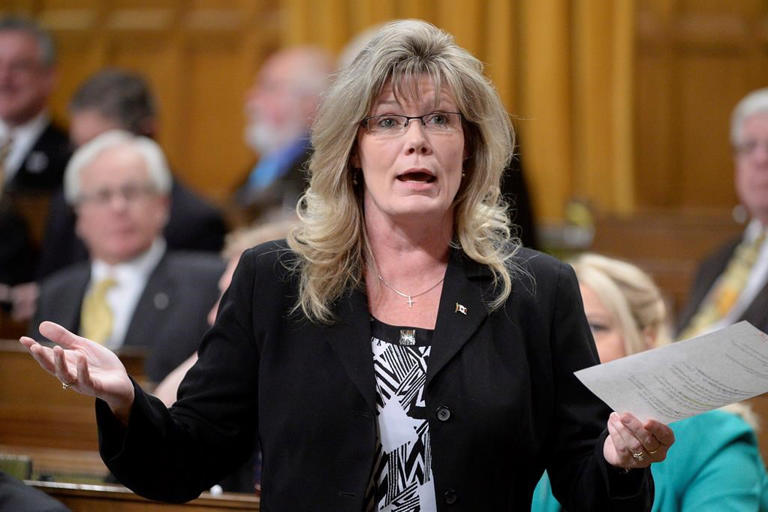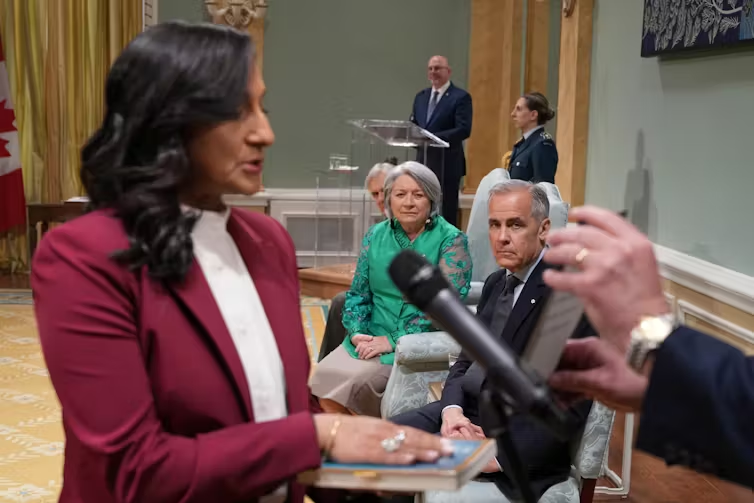Heather Stefanson – Former Premier of Manitoba
At the time of recording, Heather Stefanson was the Premier of Manitoba. In October 2023, the NDP won a majority in Manitoba’s provincial election, but Heather stayed on as the PC Party Leader to help the Conservatives transition to the Official Opposition.
Heather Stefanson is the 24th Premier of Manitoba and the first woman ever to hold the role. She was elected to the Manitoba legislative assembly in 2000, and she has won every election since.
Premier Stefanson has navigated the ups and downs of politics for over 20 years. She has mentored other women who want to get involved in public service, and she has raised two kids while serving her constituency, her community and her province. The Premier joined Jen and Catherine on this episode of The Honest Talk to discuss her childhood, making choices between family and career and managing stress and pressure.
Note: This transcript was edited for clarity and length.
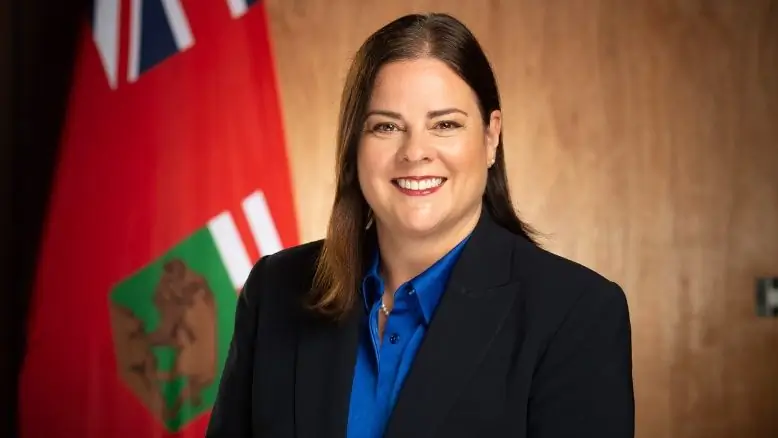
The decision to come back to Manitoba
Catherine Clark: You have noted in some interviews that a lot of your friends and your peers moved away from Manitoba to go to school or to work, and they didn’t come back. You studied and worked out of the province at the beginning of your career, but you came back to Manitoba. Why did you do that?
Heather Stefanson: I went to school at University of Western Ontario, and then I moved to Ottawa. I applied in every single Minister’s office and ended up in the Prime Minister’s office. But I met my future husband there as well. He left there to go to law school, and he ended up doing his last year back in Manitoba. And we came back here together. We’ve raised our kids here. And they’re actually away at school now, but we look forward to them coming back as well.
Jennifer Stewart: What was it like working in the Prime Minister’s office? And how did that impact you and your career trajectory?
Heather Stefanson: I learned so much at a very young age, really the inner workings of government and how it works. It was an incredible experience. I worked right in Mila Mulroney‘s office, right in the Prime Minister’s office. And I got to know the family quite well, too. And from a family perspective, what it means to get into politics and, and some of the challenges with that as well. What a tremendous experience it was.
Door-to-door campaigning with Dad
Catherine Clark: Do you remember the first moment in your life when politics made an imprint on you?
Heather Stefanson: Absolutely. I think I was seven years old and my father was running in a provincial election at the time. I was going door to door with him. I met so many people that way and just working back then I mean, old school, right? You’re licking envelopes and stuffing envelopes and getting them out through snail mail. Campaigns are very different today. But just thinking back on those times: just what an incredible experience that was at a very, very young age.

Jennifer Stewart: You then went into the investment industry. What lured you back into politics?
Heather Stefanson: I really enjoyed the investment industry. I got married when I was in that industry. We moved into my current riding of Tuxedo. Gary Filmon was still Premier at the time; he was also the MLA for our area. I was brought on his executive to help him out and then co-chaired our campaign in 1999, and that was an incredible experience. And when we lost government and when Gary resigned his seat, I really had to think twice about, do I really want to take this plunge into politics itself or do I want to stay in the investment industry? This was the path I chose, and 22 years later, here we are.
What it’s been like having kids while running for office
Catherine Clark: When you first ran for politics, you didn’t have kids. And in some ways, that is a blessing. Because when you’re born into it, you don’t know anything different. But what has it been like for you, having kids and raising kids and doing both in the public eye while balancing this career?
Heather Stefanson: It’s been such an amazing experience having my kids born into this. Victoria, my eldest, was born one year to the day after I was first elected, so we share an anniversary and then I can remember how many years I’ve actually been in this. So she just turned 21. And here we are. But I can remember a photo in the Winnipeg Sun where I was pregnant, I was showing. The story was looking at renewal and rejuvenation within the legislature as well. And so it was kind of a neat time to just be pregnant. But then also having the kids here. I had pack and plays in my office, I had people helping out to look after my kids at times where daycare wasn’t there for me, where I had to bring the kids in, because my husband traveled quite a bit. So I brought them into my office, and I’d have to get someone to look after them while I’d go in for question period. Or I’d go to a speech in the Chamber and come back, and there’s my smiling Victoria in the pack and play. And so my kids have really grown up. And it’s such an incredible thing for them as well.
Jennifer Stewart: I think it’s an incredible example you’re setting and if there’s one thing I think collectively we can teach our children, it’s resilience and work ethic, and model both of those characteristics. So you were relatively young when you were running. You were a woman, you were pregnant, and you were pretty ahead of your time. Were your colleagues supportive? Or was that a challenging time for you to navigate?
Heather Stefanson: When I was first running, I remember going door to door with my mother-in-law, and we’d go to a door and for some reason they would always say: “Oh, you’re too young for politics.” And then my mother-in-law would pipe up from the back and say: “Well, she’s 30.” “Oh, you’re 30? Well, that’s fine then. That’s okay.” Somehow 30 was okay, so we got through that. (laugh)
And then the guys in our caucus who have been around for a long time, very supportive, but maybe did not necessarily know how to approach me on things. And so I remember this distinctly thinking, this is a great job. I come in, we’ve got caucus at quarter to one, we go in for question period at 1:30, and I’m done for the day. So this happened for a week or so. And then they had Bonnie Mitchelson, one of my colleagues at the time, and a veteran and politics and a former cabinet minister under Gary Filmon, came forward and took me aside and said, you know, there is more to the job than just question period. You do have to show up for debates in the afternoon. You do have to participate. So she took me under her wing and really taught me the ropes, and I’ll never forget that.
Saying no to a leadership role
Catherine Clark: I’ve heard that you were encouraged to run for Premier several years ago, but you chose not to, because you felt that your kids were too young. And a lot of women can actually relate and making that type of a professional decision. But at the same time, a lot of them worry that by doing so they’ll have forever blown their chances of taking the next big step in their careers. Can you talk to us about your experience saying ‘no’ that time and what it taught you about yourself?
Heather Stefanson: I think there were a couple of times, because we went through a couple of leaders before we earned government, but my kids, my family always comes first. And my husband traveled and still does quite a bit, so I was still the primary caregiver. And I thought twice about what does that mean, being the leader of the party, and I saw our other leaders, and so I felt very strongly that the time for me was not at those times.
But this time my kids were older, and they came to me and said – I’m going to get emotional here – they said: “Mom, you were there for us, the last times, now it’s your time.” And so then I took the plunge.
Heather Stefanson
Jennifer Stewart: You’ve talked about the value of compassion and respect, which are two qualities that a lot of people might say are currently lacking in politics. Why do you think those qualities are important to you? And how have you made them a part of your leadership style?
Heather Stefanson: I’ve always started taking a collaborative approach to things and had a lot of respect for others. I’ve learned so much in this job from so many different people, just being an MLA, and then a cabinet minister, and then getting into this role, the importance of really keeping in touch with people in the communities. If you’re not in touch with people, you’re not really showing them the respect that they deserve. They’re the ones that know what is best for our province, what they want out of a leader in a government. Sometimes I’ve seen other people take more of a combative approach; it’s just not who I am. I’m just someone that really wants to sit down, actually work with people, and most importantly, get the job done and get positive results. I’m very much results oriented.
Catherine Clark: Is it more difficult to be collaborative as Premier?
Heather Stefanson: No, I’ve taken a very collaborative approach since I became Premier. I felt it was so important, one of the most important things we could do. I don’t know if it’s just being a woman and this is the way we deal with things, trying to build consensus, build a team, build collaboration, because I think we really focus on wanting to get things done.
How do women lead
Jennifer Stewart: How do you think women lead differently than men?
Heather Stefanson: I think we take that collaborative approach. I think we’re very focused on not what positions we’re in, but on working together to get things done. I think as women, we all talk about how we can work together but we actually do sit down and get it done. We’re action oriented.
The importance of meditation and mindfulness
Catherine Clark: I’d love to talk about how you handle the pressure of the role because everyone has great days and then everyone has down days, and they’re particularly tough in politics because they happen in public. So there is a lot of pressure. I understand that you have started to meditate, but maybe you can tell us a little bit more about that, and why it’s important for you?
Heather Stefanson: Managing stress between your personal life and your career is critical – exercising, looking after yourself. I think part of that is your mindfulness and meditation, which will really quiet things down. Things are go go go go go, at the office early in the morning, out at events to late at night most days of the week. You need to have that quiet time to regroup. A friend put me in touch with ziva.com, and I looked into their program and just found that it’s been very beneficial. It’s actually two meditations a day, but I can’t always get those in. But it’s so important. If you’re not looking after yourself, mentally and physically, it’s going to be very difficult to have that balance in your life. So it’s really helped me a lot to be able to focus better on the things that we need to really get done.
Jennifer Stewart: Is there anything that surprised you, or that you’ve learned about yourself, since taking those moments of quiet and reflection?
Heather Stefanson: I always knew getting into this role as Premier it was going to be an uphill battle. I knew that there was going to be a lot of work, and a lot of energy was going to be needed moving forward. I was a cabinet minister before, so people said, “Oh, you’ve been around for 22 years. You’re ready for this.”
But you’re never ready for a job like this until you actually get into the role and start to see day to day. It’s a very challenging role as Premier. But there are so many incredible parts to this role as well.
Heather Stefanson
And I just feel so blessed to have been given the opportunity to play a role this way, and to be the Premier of our province and meet so many incredible people in our community.
Dealing with criticism as a leader
Catherine Clark: Any person who is in a position of leadership is going to face criticism. And I wonder what your advice is for other women about handling criticism in their own careers and professional lives? What have you learned?
Heather Stefanson: I got this advice from a former Premier of Newfoundland, who said to me: “Look, there’s going to be lots of times where it’s tough. People are saying negative things about you now, and in the days of social media it’s that much more difficult.” And he always said to me: “Make sure you keep focused. And make sure you remove the noise from your life.” What I would say to others is maintain your focus and don’t get sidetracked because of what people are saying. And don’t take it personally.
Jennifer Stewart: How do you want to be remembered both politically and in your personal life?
Heather Stefanson: I would say politically I’m someone that really has been focused on making sure that we’re doing what’s in the best interest of Manitobans and Manitoba. And as someone who maintained the focus and really got things done for our province. In my personal life, I care very deeply about my family. I love my kids, and I want to see them succeed and have great opportunities moving forward. And they’re certainly on great paths, so I’m so incredibly proud of them.
I am a mom first and foremost, and Premier second.
Heather Stefanson
Catherine Clark: Would I tell other women that politics is a good career choice?
Heather Stefanson: Absolutely. I think about the opportunities that my kids have had, what they got to learn has been phenomenal for them. I would say to every woman, we need more women in politics, because I actually think that the more women we have in politics, the more we’re going to get done.
We need more women in politics.
Heather Stefanson

